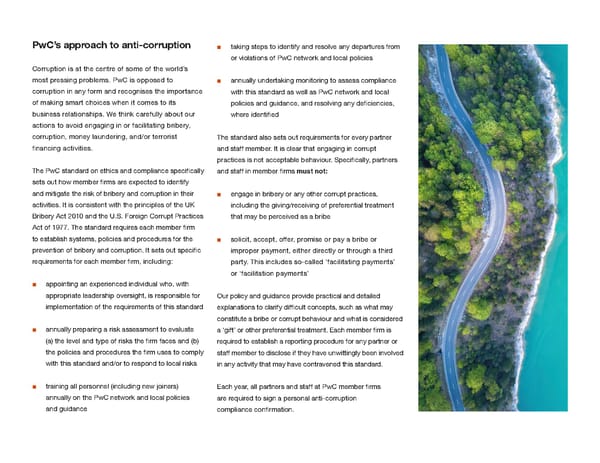PwC’s approach to anti-corruption ■ taking steps to identify and resolve any departures from or violations of PwC network and local policies Corruption is at the centre of some of the world’s most pressing problems. PwC is opposed to ■ annually undertaking monitoring to assess compliance corruption in any form and recognises the importance with this standard as well as PwC network and local of making smart choices when it comes to its policies and guidance, and resolving any deifciencies, business relationships. We think carefully about our where identiifed actions to avoid engaging in or facilitating bribery, corruption, money laundering, and/or terrorist The standard also sets out requirements for every partner ifnancing activities. and staff member. It is clear that engaging in corrupt practices is not acceptable behaviour. Speciifcally, partners The PwC standard on ethics and compliance speciifcally and staff in member ifrms must not: sets out how member ifrms are expected to identify and mitigate the risk of bribery and corruption in their ■ engage in bribery or any other corrupt practices, activities. It is consistent with the principles of the UK including the giving/receiving of preferential treatment Bribery Act 2010 and the U.S. Foreign Corrupt Practices that may be perceived as a bribe Act of 1977. The standard requires each member ifrm to establish systems, policies and procedures for the ■ solicit, accept, offer, promise or pay a bribe or prevention of bribery and corruption. It sets out speciifc improper payment, either directly or through a third requirements for each member ifrm, including: party. This includes so-called ‘facilitating payments’ or ‘facilitation payments’ ■ appointing an experienced individual who, with appropriate leadership oversight, is responsible for Our policy and guidance provide practical and detailed implementation of the requirements of this standard explanations to clarify dififcult concepts, such as what may constitute a bribe or corrupt behaviour and what is considered ■ annually preparing a risk assessment to evaluate a ‘gift’ or other preferential treatment. Each member ifrm is (a) the level and type of risks the ifrm faces and (b) required to establish a reporting procedure for any partner or the policies and procedures the ifrm uses to comply staff member to disclose if they have unwittingly been involved with this standard and/or to respond to local risks in any activity that may have contravened this standard. ■ training all personnel (including new joiners) Each year, all partners and staff at PwC member ifrms annually on the PwC network and local policies are required to sign a personal anti-corruption and guidance compliance conifrmation.
 Global Annual Review | PwC Page 73 Page 75
Global Annual Review | PwC Page 73 Page 75